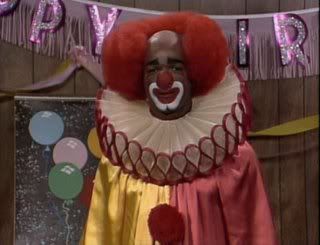Break out the clown shoes and slapsticks:
“Fighting corruption and supporting the rule of law in Afghanistan are top priorities for this administration, and we will continue to assist the Afghan government in creating and sustaining the effective criminal justice system to which the Afghan people are entitled,” Mr Holder said in the statement from Kabul.
I don’t know what to say anymore. These people really are as obtuse and lacking in self-awareness as the Bush administration. It’s not like we don’t have our own leviathans of corruption right here in the good ol’ U.S. of A, Mr. U.S. Attorney General.
For example,
Have you noticed the ubiquitous corruption and fraud on Wall Street? (Hint: bigger than a breadbox.)
Of course, laundering drug money is serious business, indeed:
Lawyers with the Justice Department have been posted in Kabul to train Afghan prosecutors and police that investigate drugs and narcotics-related offences, such as corruption and money laundering, the statement read.
We certainly can’t afford to have them laundering drug money! We’re having a hard enough time trying to corner the market in our hemisphere:
Wachovia admitted it didn’t do enough to spot illicit funds in handling $378.4 billion for Mexican-currency-exchange houses from 2004 to 2007. That’s the largest violation of the Bank Secrecy Act, an anti-money-laundering law, in U.S. history – a sum equal to one-third of Mexico’s current gross domestic product.
Snip-
“It’s the banks laundering money for the cartels that finances the tragedy,” says Martin Woods, director of Wachovia’s anti-money-laundering unit in London from 2006 to 2009. Woods says he quit the bank in disgust after executives ignored his documentation that drug dealers were funneling money through Wachovia’s branch network.
“If you don’t see the correlation between the money laundering by banks and the 22,000 people killed in Mexico, you’re missing the point,” Woods says.
Snip-
The bank didn’t react quickly enough to the prosecutors’ requests and failed to hire enough investigators, the U.S. Treasury Department said in March. After a 22-month investigation, the Justice Department on March 12 charged Wachovia with violating the Bank Secrecy Act by failing to run an effective anti-money-laundering program.
Five days later, Wells Fargo promised in a Miami federal courtroom to revamp its detection systems. Wachovia’s new owner paid $160 million in fines and penalties, less than 2 percent of its $12.3 billion profit in 2009.If Wells Fargo keeps its pledge, the U.S. government will, according to the agreement, drop all charges against the bank in March 2011.
Drop all charges. That’s some tough-assed crime-fighting.



5 comments
Skip to comment form
Author
Perfect.
How much did he get?
Apt.